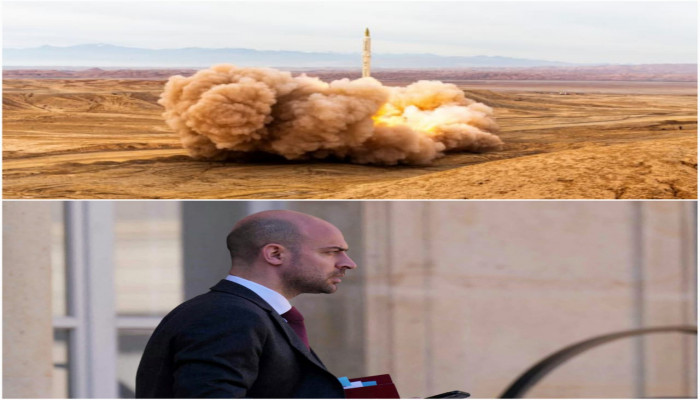France warns of inevitable military clash if Iran nuclear deal talks fail
- In Reports
- 04:55 PM, Apr 03, 2025
- Myind Staff
France’s foreign minister issued a stark warning on Wednesday, stating that without a swift agreement between world powers and Iran over its nuclear program, military conflict could become "almost inevitable." His remarks came after President Emmanuel Macron held a rare, undisclosed meeting with key ministers and experts to discuss the situation in Iran. Foreign Minister Jean-Noel Barrot’s statement appeared to increase diplomatic pressure on Tehran.
European nations are working toward a diplomatic resolution, aiming to reach a deal to limit Iran’s uranium enrichment activities by the summer. This effort is crucial ahead of an October 2025 deadline, when U.N. sanctions linked to the 2015 nuclear agreement with Iran are set to expire. Western powers argue that Iran’s nuclear program is a covert attempt to develop nuclear weapons, a claim that Iran has consistently denied.
“The window of opportunity is narrow. We only have a few months until the expiration of this (2015) accord. In case of failure, a military confrontation would seem to be almost inevitable,” Barrot informed a parliamentary hearing.
A recent cabinet meeting, confirmed by three diplomatic sources, was unusual and reflects growing concern among Washington’s European allies. They fear that the U.S. and Israel may carry out airstrikes on Iran’s nuclear sites unless a swift diplomatic agreement is reached on Iran’s nuclear program.
The Pentagon announced on Tuesday that the U.S. has bolstered its military presence in the Middle East, deploying additional warplanes. This comes as part of an ongoing U.S. bombing campaign against the Iran-backed Houthis, who control much of Yemen.
A senior European official noted that European strategists are questioning whether these military actions could be a prelude to a U.S. strike on Iran in the coming months. U.S. President Donald Trump has urged Iran’s Supreme Leader Ayatollah Ali Khamenei to engage in negotiations immediately. On Sunday, he warned Iran of potential bombing and secondary tariffs if it failed to reach an agreement on its nuclear program.
Meanwhile, Israel’s foreign minister is set to visit Paris on Thursday. Diplomatic sources also revealed that ministers from France, Britain, and Germany, who were part of the 2015 nuclear deal, are looking to discuss Iran’s nuclear issue with U.S. Secretary of State Marco Rubio during this week's NATO ministerial meeting in Brussels.
Trump pulled the U.S. out of the 2015 nuclear agreement, which had imposed strict restrictions on Iran’s nuclear program in exchange for sanctions relief. Following the withdrawal, Iran significantly exceeded the agreement’s limits on uranium enrichment, producing stockpiles with a level of fissile purity far beyond what Western nations consider necessary for civilian energy purposes and approaching the threshold for nuclear weapons.
European nations have been increasing diplomatic pressure to bring Iran back to the negotiating table. They have held multiple discussions with Iranian officials, including technical-level talks last week, to try and set the stage for renewed nuclear negotiations.
The Trump administration initially prioritised a “maximum pressure” strategy on Iran, while European nations struggled with coordination, according to diplomats.
European powers, who have the option to reinstate full UN sanctions before October, had aimed to persuade Iran to negotiate new restrictions on its nuclear program. Their goal was to finalise an agreement by August, allowing enough time to establish new limits on Iran’s activities and begin lifting sanctions before the 2015 nuclear deal expires in October 2025.







Comments